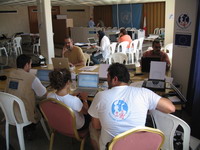UN telecoms to provide access to television broadcasts
U.N. telecoms will give access to bandwidth currently reserved for terrestrial television broadcasts, offering the promise of high-speed Internet access on-the-move anywhere in the world by 2015.

The decision will give manufacturers of wireless equipment greater security to develop better and cheaper devices. U.S. officials lobbied hard for a global agreement on spectrum use, arguing that a common approach was better than each country or region deciding to use separate frequencies for next-generation mobile services.
Countries agreed to the rule after a month of old vs. new technology battles at the U.N.-hosted World Radiocommunications Conference in Geneva, which pitted broadcasters against telecoms for control of a prime stretch of radio spectrum.
European broadcasters have warned that viewers of digital terrestrial television could see their reception interrupted by nearby cell phones, computers and handheld devices shared the frequency.
European and African countries will limit the amount of bandwidth available for mobile services to half of what will be offered in other regions as part of the deal, a move seen as a concession to their national broadcasting companies.
A number of regions also opted to wait until 2015 before making the most inexpensive part of the radio spectrum available to advanced mobile services. While consumers in the United States likely to gain access to these services from early 2009, it will take an additional six years for those in Europe, Africa, China, Russia and much of the Middle East.
Subscribe to Pravda.Ru Telegram channel, Facebook, RSS!





